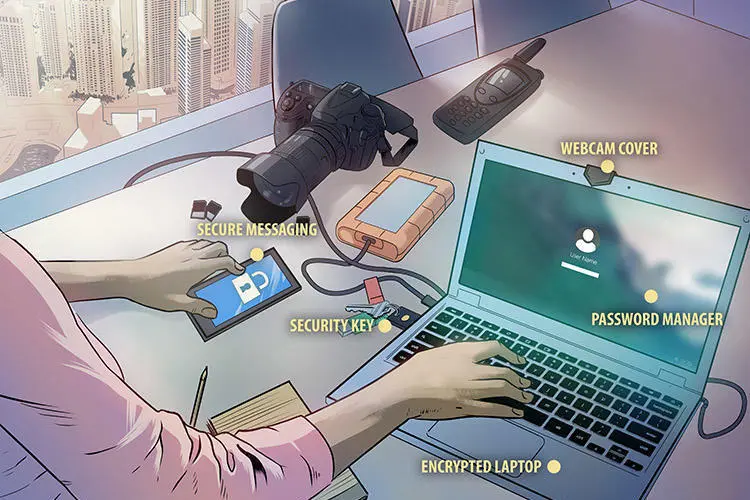The Torch is a weekly newsletter from the Committee to Protect Journalists that brings you the latest press freedom and journalist safety news from around the world. Subscribe here.
When journalists can’t protect themselves or their sources, everyone’s right to information is at risk. Ahead of Data Privacy Day on Sunday, we’re highlighting the ever-present threat of surveillance that journalists face today.
➡️ Just this week, CPJ called again for an immediate moratorium on the sale of spyware technology after the phones of two Togolese journalists were found to have been infected with Pegasus spyware in 2021. Both journalists currently face criminal prosecution for their work and told CPJ they were surprised to learn they had been targeted.
➡️ And in Ukraine, staff members of the investigative outlet Bihus.info found that their phones were allegedly wiretapped and monitored for about a year. The wiretapping was revealed when a video of the staff at a New Year’s party alongside recorded phone conversations was published on YouTube.
These incidents are part of an ongoing pattern. Last year, CPJ spoke to a victim of state-sponsored spyware about the experience of finding out her phone had been monitored: Galina Timchenko, head of independent Russian news website Meduza and CPJ’s 2022 Gwen Ifill Awardee. Her phone was infected by Pegasus surveillance spyware shortly after the Russian government designated her outlet as an “undesirable” organization.
The violation of her privacy sickened her. “I feel like I am naked in the street,” she told CPJ.
Research by CPJ and other organizations shows sophisticated spyware products marketed to governments to fight crime have been used to target the press, posing an existential crisis for journalism and press freedom around the world.
⚠️ How to protect yourself: Review and share our digital safety resources, including the digital safety kit, risk assessment, and safety advisory for journalist targets of Pegasus spyware. And you can sign up to receive our latest safety information straight to your inbox here.
🔎 CPJ has documented how zero-click spyware like NSO Group’s Pegasus can take over a phone without a user’s knowledge or interaction. Watch our video about how spyware works:
Global press freedom updates
- CPJ calls for immediate release of Sudanese journalists Ogail Ahmed Naime, Haitham Dafallah, and Dafallah’s brother
- Taliban detains Ehsan Akbari, Afghan journalist with Japan’s Kyodo News
- Pakistani TV journalist Shoaib Burni injured in gun attack in Karachi
- CPJ is disappointed by the passage of the Online Safety Bill in Sri Lanka
- CPJ, others call for lawsuits against Greek journalists and outlets to be dropped
- Belarusian authorities start trial of Aliaksandr Ziankou, bring charges against Ales Sabaleuski, detain Yauhen Hlushkou
Spotlight

When the Israel-Gaza war began, Alaa al-Rimawi snapped into action, covering developments on J-Media, the West Bank-based news agency he directs, as well as on TikTok and Facebook. But his conflict coverage would be short-lived. Less than two weeks after the start of the war, Israel banned J-Media on security grounds and quickly arrested three other J-Media employees. On October 19, al-Rimawi met the same fate. He was undergoing a medical examination at a hospital when Israeli forces raided his home in Ramallah, detaining his son to pressure al-Rimawi to turn himself in. Later that day, al-Rimawi surrendered himself at nearby Ofer Prison.
Like the majority of the 17 Palestinian journalists on CPJ’s 2023 prison census, al-Rimawi has not been charged.
Read more in our special feature by Naomi Zeveloff, CPJ’s senior editor of features and analysis.
More on the Israel-Gaza war:
⚡️ As of January 25, CPJ has documented 83 journalists and media workers killed while covering the war, 16 journalists injured, 3 missing, and 25 arrested.
⚡️ This week, CPJ and partners called on the EU to help journalists in the war, explaining that its unprecedented toll on journalists “has obvious and profound implications for the ability of the public, including the citizens of the European Union, to be informed about a conflict with local, regional, and global implications.”
- Most ‘fake news’ legislation risks doing more harm than good amid a record number of elections in 2024 — Center for News, Technology & Innovation
- Remembering the ‘father figure’ of journalism in Gaza — Umar Farooq, Columbia Journalism Review
- The landscape is darkening: A review of freedom of expression in South Africa (2018-2023) — Alan Finlay, Campaign for Free Expression
- At WEF, a warning for the U.S. about threats to free expression — Meg Little Reilly, Forbes
- Rwanda: End abuses against journalists — Human Rights Watch
- Analysts: Assassination plot shows extremes Iran employs to target critics — Liam Scott, Voice of America
Do you have an Amazon Alexa-enabled device? Enable CPJ's flash briefing skill to stay up to date with the latest press freedom news from around the world.
